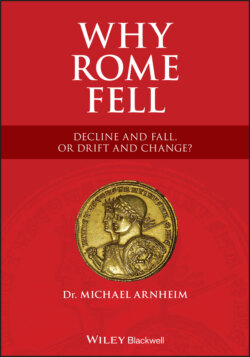Читать книгу Why Rome Fell - Michael Arnheim - Страница 18
The Use of the Past
ОглавлениеTacitus claimed to have written sine ira et studio, (without anger or passion), or, in other words, without partiality either positive or negative. The great Greek historian Thucydides (c. 460–-c. 400 BCE) wrote his Peloponnesian War in the belief that an accurate knowledge of the past would be useful for the future. (Thuc. 1.22.4.) The first prerequisite to this end must, therefore, be accuracy, and, as far as possible, objectivity. True objectivity is probably not an attainable goal, but that does not exempt historians from at least making the attempt.
The starting point must be choice of language. For example, the phrase, “the unnerving but mercifully brief reign of Julian” could not be anything other than overtly subjective, judgmental, hostile, and emotive (Brown 1997a, p. 638)—and even more so than “Williamanmary was a Good King,” in 1066 And All That, the witty parody of traditional British historical writing, written by W.C. Sellar and R.J. Yeatman and published in 1930.
Because Julian “the Apostate” (r. 361–363) is known chiefly for his anti-Christian religious policy, it can safely be concluded that the negative description of his reign is motivated by disagreement with that policy, which ties in with the same author’s pro-Christian special pleading, and otherwise rose-tinted vision, inevitably plunging him headlong into a distorted view of the period. (See Chapter 12.)
Avoidance of overtly subjective, judgmental, and emotive language is important in itself, but also for another reason, namely, to use the study of the past as a tool for the future. But this can only be done on the basis of a tested empirical framework for the comparative study of different societies. There is nothing more disappointing than to see solid historical research run into a blind alley, for want of a properly analyzed framework, as happened to Sir Ronald Syme’s potentially valuable work on Augustus. Having correctly characterized Augustus’s rule as a monarchy, Syme opined that it was an oligarchy on the basis of a supposedly general “law” that “A monarchy rules through an oligarchy” (Syme, R., 1939, p. 8.)—a muddled conflation of two diametrically opposed forms of government. (See Chapter 1.) Chapter 6 illustrates how a correct formulation of power structure can be applied to different historical periods.
